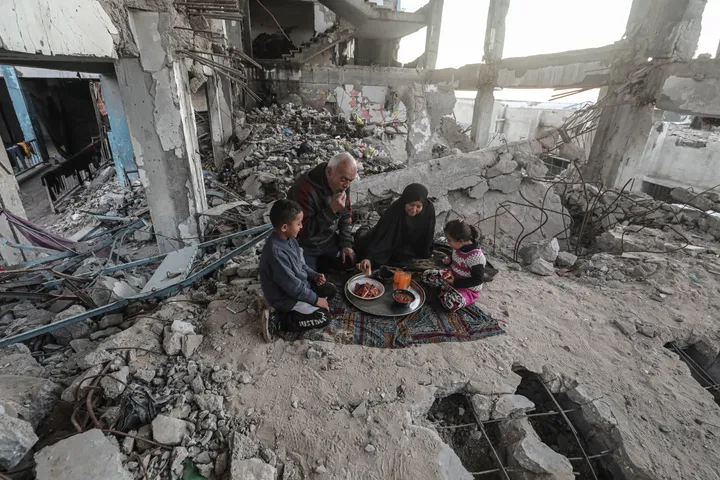HUDAIDA, Yemen — Until June 2018, Mohammed Qasim worked as a fisherman in Mandhar village on the outskirts of Yemen's Hudaida city. The war however reached his doorstep with the Saudi-led coalition forces bombing his neighbourhood.
Qasim fled his village along with his wife and three children.
“We did not take anything with us, we only were thinking how to reach a safe area. We felt happy when we arrived to the city,” Qasim’s wife Noureyah told TRT World.
Soon after taking refuge in Hudaida, Qasim learnt all the oshas - the houses made of straw and clay - in his village, including his own, were burnt to the ground.
“It was the first day of Eid when we fled our house," Noureyah recalled. "We are in a permanent grief ever since.”
Qasim scraped together some work with his friend, a fellow fisherman, and both started selling fish in Hudaida.
But fishing in the sea involved grave dangers, as the airstrikes targeted fishermen, she said, adding that only the most desperate and hungry ones risked sailing in the waters of Red Sea.
“My husband sailed in Al Mihwat area and he sold his stock in the nearby fish market.”
On August 3, 2018, the fish market was hit by an alleged Saudi-led airstrike, killing at least 20 civilians, including Qasim.
“I heard the explosion and half an hour later a neighbour came to me shouting ‘Qasim is dead'," Noureyah said.
She rushed to the market and found a dead body with its limbs missing. She was told that the dismembered corpse was her husband's.
“I couldn't recognise him. They left nothing of him," she said. "My children suffered from psychological trauma and they refuse to believe their father is no more. They cried for several weeks.”
Children as breadwinner
With Qasim gone, his 11-year-old son Mohammed Amin became the breadwinner for the family.
“My father wanted us to be independent and not wait for people to help us," Amin told TRT World. "So I quit school and restarted my father's fish business."
Amin works with his father’s friends in the same fish market where his father was killed. He makes $2 (YR1,000) per day. With that money, he manages to buy food for his family.
“I only think about how to make some more money and get by," the 11-year-old said.
Every morning as Amin sets his kiosk up at the same spot where his father sold fish, he gets flashes of his father's blood-soaked and dismembered body. He fights those thoughts, puts his head down and tries to focus on selling fish.
But whenever warplanes speed past above him, he runs out of the market and hides inside his home. "The sound of fighter jets scares me," he said. "I don't know how people work while they pass over them."
Amin is tired of making ends meet and he's waiting for the day when he can leave all the emotions tied to his father's killing behind and return to Mandhar village.
“We know a lot of people in our village. I'm sure if we go back, they will help me earn more money," he said.
Mahmoud Fawzi, 13, is another child works in the same fish market to eke out a decent living for his family of five. He lost his father in the same explosion in August 2018.
Fawzi still wants to continue with his education but circumstances forced him to abandon his school and take over his father's business, “My dream was to teach Arabic in schools but I can't become a teacher anymore. I'm the eldest son and I have to make a living for my family,” he told TRT World.
Fawzi says he's learned to muster courage and face the hovering fighter jets with a defiant gaze. At a very young age he has thought deeply about what it means to live and die and has come to a philosophical conclusion of sorts. "We cannot flee from death," he said. "We live under the mercy of Allah and everyone will meet his destiny.”
In a small and intimate Al Mihwat fish market in Hudaida, several dozen children have replaced their fathers, taking over the fish business after they were killed in airstrikes.
Jamal al Shami, the head of the Democracy School, said that the number of child breadwinners had increased manifold since the beginning of the Yemen war in 2015.
“The circumstances are such that children cannot escape working for their families as their fathers either lose jobs or get killed in the war," Shami said.
As many as two million Yemeni children are out of school and have “very limited” opportunities to return to education, UNICEF warned at the end of last month.























